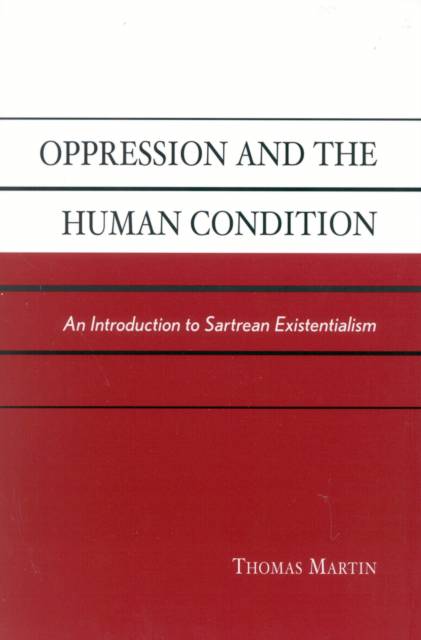
Je cadeautjes zeker op tijd in huis hebben voor de feestdagen? Kom langs in onze winkels en vind het perfecte geschenk!
- Afhalen na 1 uur in een winkel met voorraad
- Gratis thuislevering in België vanaf € 30
- Ruim aanbod met 7 miljoen producten
Je cadeautjes zeker op tijd in huis hebben voor de feestdagen? Kom langs in onze winkels en vind het perfecte geschenk!
- Afhalen na 1 uur in een winkel met voorraad
- Gratis thuislevering in België vanaf € 30
- Ruim aanbod met 7 miljoen producten
Zoeken
Oppression and the Human Condition
An Introduction to Sartrean Existentialism
Thomas Martin
Paperback | Engels
€ 53,45
+ 106 punten
Omschrijving
Oppression and the Human Condition is both a valuable teaching tool and an insightful addition to scholarship on the philosophy of Jean-Paul Sartre. Students and teachers will find it an excellent and accessible introduction to Sartre's existentialism, ideal for courses in existentialist and 20th century philosophy. Equally, Sartre scholars will find that the book, especially the sections on oppression and "bad faith," gives them much to think about.
Author Thomas Martin applies Sartre's philosophy to contemporary issues and concerns, and draws on two case studies to make his point. The cases examine modern-day oppressors-in one case an anti-semite, in the other a sexist who objectifies women-in the context of Sartre's "bad faith." The case studies also reinforce Martin's argument that Sartre's early philosophy, especially his concept of "bad faith," provides a framework for discussions of oppressions such as racism and sexism.Specificaties
Betrokkenen
- Auteur(s):
- Uitgeverij:
Inhoud
- Aantal bladzijden:
- 168
- Taal:
- Engels
Eigenschappen
- Productcode (EAN):
- 9780742513242
- Verschijningsdatum:
- 6/11/2002
- Uitvoering:
- Paperback
- Formaat:
- Trade paperback (VS)
- Afmetingen:
- 156 mm x 219 mm
- Gewicht:
- 267 g

Alleen bij Standaard Boekhandel
+ 106 punten op je klantenkaart van Standaard Boekhandel
Beoordelingen
We publiceren alleen reviews die voldoen aan de voorwaarden voor reviews. Bekijk onze voorwaarden voor reviews.









